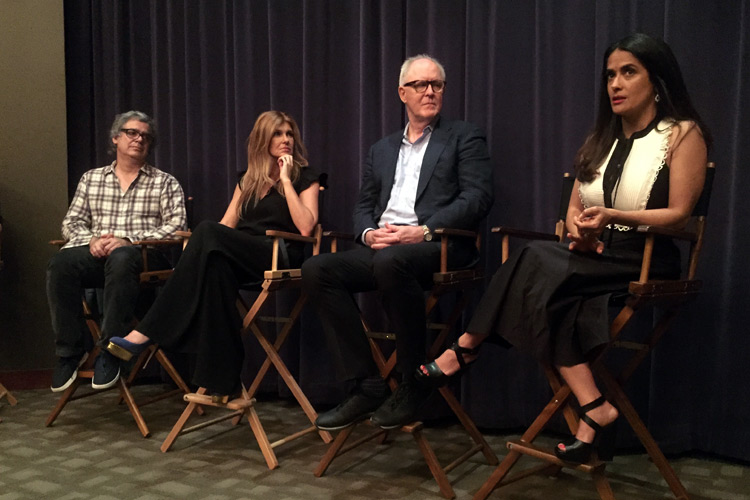The following questions and answers are excerpted from a conversation that followed the NBR screening of Beatriz at Dinner.
Your character is particularly interesting because he comes across as an avatar of our current president, only more articulate and charismatic. What was your approach to him?
John Lithgow: I choose to take that as a compliment and it’s inevitable that people will interpret and make the comparison to that. In my mind, he’s his own character and far more different than similar to Donald Trump. I don’t think Mike writes metaphorically or symbolically, so I don’t think he went out to write about Donald Trump. We made the film before the election, so after the election the film became a more urgent lightning rod of a movie.
Miguel Arteta: I think Doug Strutt is more of a confident person that believes in his convictions and cannot be easily made. I love how convincing that you are and the arguments are.
Lithgow: The first conversation I had with Miguel was on the phone and he talked about Doug as if he adored the guy. It was quite surprising how enthused he was about the guy, but I think that’s how you have to approach him. It’s more interesting to have a man who is not so clearly the villain.
Connie Britton: I think all of the characters in the film have that integrity that you’re talking about, which is why it stays in a land of something grounded and not something stereotypical. If we would have ventured into the land of cliché it wouldn’t be dynamic or relevant. This makes all of the characters specific and compelling.
Though I root for Beatriz, the character of Cathy is sympathetic and I don’t want Beatriz to ruin her night or husband’s night. How did you approach creating such a sympathetic character?
Britton: I think that all of the characters are acting from a place of survival and the things that make their lives comfortable or relatable are the things that they will do anything to uphold. For Cathy, she loves Beatriz and wants to do anything she can for her since Beatriz saved her daughter. That’s absolutely genuine and authentic. Unfortunately, Cathy is limited by her world view. It’s actually very hard to look outside of your own life when you’re busy making sure that your own life is comfortable. So whenever Cathy looks at Beatriz, she sees herself… she can’t ever really see Beatriz.
Beatriz says a lot in the film, but is also quiet and observant. What was the process in developing such an internal performance?
Salma Hayek: It was very specific because that’s exactly what Miguel wanted. He didn’t want anyone to know what Beatriz was thinking, so I was not allowed to have movement on my face or cry. Beatriz had to have a complex thought process that was not preplanned. Her intelligence comes from her instincts and being present in the moment. We spent such beautiful and quality time learning about each other through this character, so I was very happy to be working with such an intelligent and spiritual director. He never wanted me to pre-manipulate what she was thinking, so I had to go to a meditative space where I was able to see and read everything for the first time, trusting the complexity of the film.
Arteta: I appreciate how you put your heart in it and I think it helped that Salma and I spoke Spanish together. I was directing these other characters in English, but was able to comfortably to direct Salma in Spanish.
The film plays like a thriller, beginning at a nice comfortable pace and the tension ramps up. How did you plan the camera techniques and music?
Arteta: I wanted the film to be shot very simply, but I wanted the anxiety to be growing on you guys and not us trying to push it on the audience. Simplicity gives the effect of being a fly on the wall. I wanted the music to have a yearning and sadness to it because the movies about being an outsider and feeling the tragedy of these divisions and yearning to go to a time where we haven’t screwed up the world and before a time when compassion has no place. I wanted people to feel the yearning for this impossible time.

